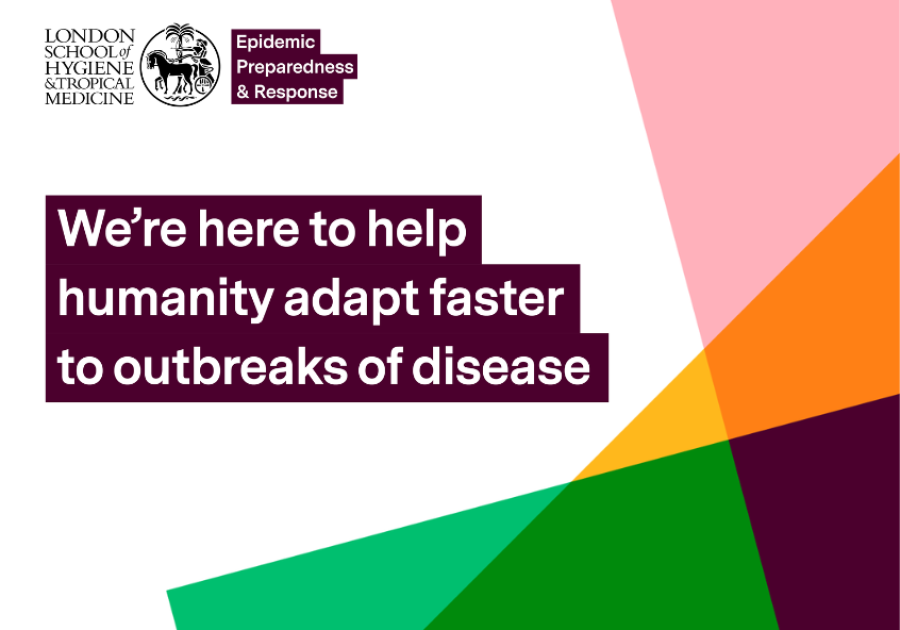New Centre for Epidemic Preparedness & Response at LSHTM accelerates collaborative approach for era of pandemics
8 November 2022 London School of Hygiene & Tropical Medicine London School of Hygiene & Tropical Medicine https://lshtm.ac.uk/themes/custom/lshtm/images/lshtm-logo-black.png
Bringing together expertise from around the world and challenging old ways of working are key to improving the global response to disease outbreaks, according to the directors of a new centre at the London School of Hygiene & Tropical Medicine (LSHTM).
The Centre for Epidemic Preparedness & Response draws on LSHTM’s unique expertise in epidemic and pandemic research, as well as strong international collaborations, to support the development of a more decentralised approach to speed up and modernise outbreak research and response.
As well as bringing together specialists based in a range of countries, the Centre supports fellowships for early career researchers embedded in Africa through the Peter Piot Fellowship scheme. The first fellows in the philanthropic programme to support African research on pandemic preparedness and climate and health – which includes mentoring by former LSHTM Director and Professor of Global Health, Professor Baron Peter Piot – will start projects with LSHTM early next year.
The Centre will provide opportunities to work alongside researchers and experts in MRC Unit The Gambia who, among other activities, ran the country’s only COVID-19 diagnostics and sequencing centre until June 2020, and teams in MRC/UVRI Uganda who led COVID-19 genomic sequencing efforts for the nearby region.
Centre Co-Director Professor Martin Antonio, Professor of Molecular Microbiology & Global Health, based at The MRC Unit The Gambia at LSHTM, said: “Together we need to make changes to break down barriers and think differently. As researchers in this field, we have an opportunity to create a blueprint for epidemic response where we learn from the examples and expertise in countries such as The Gambia and Uganda in the Ebola, meningitis and COVID-19 response.
“We need global leadership, political will, and infrastructure to develop health capacity, especially for those in low- and middle-income countries, to see pandemic preparedness as a key priority. We must seize the moment, making the pandemic the catalyst for new ways of working, deeper collaboration and more systemic change to tackle current and future threats.”
Welcoming the Centre, World Health Organization (WHO) Director General and LSHTM alumnus Dr Tedros Adhanom Ghebreyesus said: “You have rightly understood that we must connect more dots, encourage new and innovative ways to collaborate and work more effectively across disciplines.”
Many of the Centre’s experts have been at the forefront of national and international efforts, in the COVID-19 pandemic, from modelling the spread, control measures and impact of the virus, to tracking attitudes and sentiments around vaccines. Crucially the Centre will build on this experience in epidemic research.
Professor Rosanna Peeling, Chair of Diagnostics Research at LSHTM and Director of the International Diagnostics Centre (IDC) said: “Research is critical to epidemic preparedness and response and yet during an epidemic there is limited time to carry out research to accrue evidence for policy and action.
“At the International Diagnostic Centre, we provided advice on testing policy during the COVID-19 pandemic but that was only possible through close collaboration with epidemiologists, modellers, behavioural and social scientists around the world. The Centre for Epidemic Preparedness & Response champions these new approaches - its multidisciplinary global collaboration is urgently needed.”
Professor of Anthropology, Risk and Decision Science, Heidi Larson, who is also Founding Director of the Vaccine Confidence Project at LSHTM said: “The pathogen is only part of the picture. There are many factors that influence public willingness to comply with the multiple measures required during the pandemic – from masks and vaccines to working at home (when you can) and home schooling. Now is the time to consider the wider social and political contexts and realities of people’s situations which are vital to any epidemic response.”
Centre Co-Director Professor Adam Kucharski, Associate Professor in Infectious Disease Epidemiology and Sir Henry Dale Fellow at LSHTM, said: “The world sleepwalked into the COVID-19 global health emergency. There were too many instances where data wasn’t shared quickly enough, tools weren’t widely available, and action was too slow or reactive.
“COVID-19 has made people rethink how we approach epidemic preparedness and response. A lot of the dogma about what an effective pandemic plan looks like has been overturned in the last couple of years, and that means we need new ideas and research. We need to move away from this outlook where activities are very centralised and often unsustainable to one where we can all benefit from the best the world has to offer in terms of expertise and knowledge.”
Professor Liam Smeeth, Director of LSHTM, said: “Our centres play a key role in bringing together staff from across the whole of LSHTM, including overseas, and span both research and educational activities. Centres are also active externally, developing partnerships and working with policymakers and other stakeholders. In an area as fast moving and multifaceted as epidemic preparedness, having an effective central hub is absolutely critical.”
Watch the Centre for Epidemic Preparedness & Response inaugural research showcase to learn more.
LSHTM's short courses provide opportunities to study specialised topics across a broad range of public and global health fields. From AMR to vaccines, travel medicine to clinical trials, and modelling to malaria, refresh your skills and join one of our short courses today.